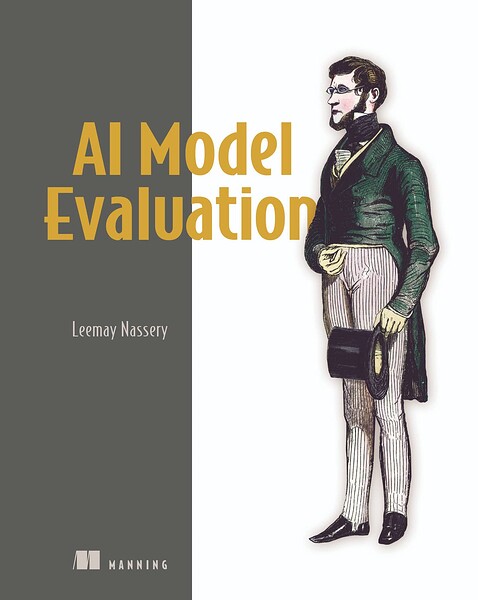ManningBooks
AI Model Evaluation (Manning)
Before deploying an AI model into production, you need to know more than just its accuracy. Will it be fast enough for your users? Will it scale under real-world traffic? Can you trust its decisions in critical scenarios? AI Model Evaluation (Manning Publications) gives you the practical tools and strategies to answer these questions—and more—so you can ship AI systems that actually work in the real world.
Leemay Nassery
Before deploying an AI model into production, you need to know more than just its accuracy. Will it be fast enough for your users? Will it scale under real-world traffic? Can you trust its decisions in critical scenarios? AI Model Evaluation (Manning Publications) gives you the practical tools and strategies to answer these questions—and more—so you can ship AI systems that actually work in the real world.
What you’ll learn in AI Model Evaluation:
- Build diagnostic offline evaluations to uncover hidden model behaviors
- Use shadow traffic to simulate production conditions safely
- Design A/B tests to measure real business and product impact
- Spot nuanced failures with human-in-the-loop feedback
- Scale evaluations with LLMs as automated judges
Author Leemay Nassery (Spotify, Comcast, Dropbox, Etsy) shares real-world insights on what it really takes to prepare models for production. You’ll go beyond standard accuracy metrics to evaluate latency, user experience, and long-term impact on product goals.
Inside the book:
Each chapter explores a different evaluation method, from offline testing and A/B experiments to shadow deployments and qualitative analysis. Hands-on examples, including a movie recommendation engine, make it easy to apply these techniques to your own AI projects.
- Full details: AI Model Evaluation - Leemay Nassery
Don’t forget you can get 45% off with your Devtalk discount! Just use the coupon code “devtalk.com” at checkout ![]()
Most Liked
peterchancc
We started exploring AI apps with LLMs, so this book should be a good reference for evaluating the open-source LLMs that we plan to use.
ManningBooks
Definitely. Here are some questions to help your team that the book addresses clearly:
-
What happens if your model is “accurate” offline but tanks your engagement metrics in production — how would you know why?
(Follow-up: Do you have evaluation strategies beyond just accuracy or F1?) -
When was the last time your team measured the system latency impact of a new AI model before launching it?
(And what if the model slowed down page load time by 200ms — would you catch it before it hits users?) -
If a model makes worse predictions for a specific user segment, do you catch that in your current evaluation process? Or are those failures only visible after a launch?
-
Before you ship a model, do you know how it affects:
- Feature latency?
- Cold start performance?
- Infrastructure cost at scale?
(Or are you finding out during the fire drill after launch?)
Are you still using the same evaluation metrics your team used 3 years ago?
(What if the nature of your product or user behavior has changed — and your evaluations are now stale?)
Hope this helps.
Cheers
peterchancc
Thanks!
Popular Ai topics

Other popular topics

Categories:
Sub Categories:
Popular Portals
- /elixir
- /rust
- /wasm
- /ruby
- /erlang
- /phoenix
- /keyboards
- /python
- /js
- /rails
- /security
- /go
- /swift
- /vim
- /clojure
- /emacs
- /java
- /haskell
- /svelte
- /onivim
- /typescript
- /kotlin
- /c-plus-plus
- /crystal
- /tailwind
- /react
- /gleam
- /ocaml
- /elm
- /flutter
- /vscode
- /ash
- /html
- /opensuse
- /zig
- /centos
- /deepseek
- /php
- /scala
- /react-native
- /lisp
- /sublime-text
- /textmate
- /nixos
- /debian
- /agda
- /django
- /deno
- /kubuntu
- /arch-linux
- /nodejs
- /revery
- /ubuntu
- /spring
- /manjaro
- /lua
- /diversity
- /julia
- /markdown
- /slackware










